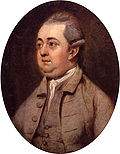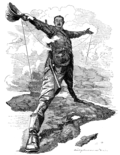The History Portal
History is the systematic study of the past, focusing primarily on the human past. As an academic discipline, it analyses and interprets evidence to construct narratives about what happened and explain why it happened. Some theorists categorize history as a social science, while others see it as part of the humanities or consider it a hybrid discipline. Similar debates surround the purpose of history—for example, whether its main aim is theoretical, to uncover the truth, or practical, to learn lessons from the past. In a more general sense, the term history refers not to an academic field but to the past itself, times in the past, or to individual texts about the past.
Historical research relies on primary and secondary sources to reconstruct past events and validate interpretations. Source criticism is used to evaluate these sources, assessing their authenticity, content, and reliability. Historians strive to integrate the perspectives of several sources to develop a coherent narrative. Different schools of thought, such as positivism, the Annales school, Marxism, and postmodernism, have distinct methodological approaches.
History is a broad discipline encompassing many branches. Some focus on specific time periods, such as ancient history, while others concentrate on particular geographic regions, such as the history of Africa. Thematic categorizations include political history, military history, social history, and economic history. Branches associated with specific research methods and sources include quantitative history, comparative history, and oral history.
History emerged as a field of inquiry in antiquity to replace myth-infused narratives, with influential early traditions originating in Greece, China, and later in the Islamic world. Historical writing evolved throughout the ages and became increasingly professional, particularly during the 19th century, when a rigorous methodology and various academic institutions were established. History is related to many fields, including historiography, philosophy, education, and politics. (Full article...)
Featured picture
Did you know (auto generated)

- ... that the Quad Cities forecast office of the National Weather Service has been directly struck by both an F1 tornado and a historic derecho?
- ... that 25 years after her career ended, Jennifer Martz remains second in NCAA Division III history in hitting percentage?
- ... that one historian considered the anachronisms of the historical novel The Rival Chiefs to be unproblematic because readers wanted "not accuracy but thrill"?
- ... that historically, lichens like Umbilicaria torrefacta have been used to naturally dye traditional Scottish tartans and textiles?
- ... that when Wilson Starbuck's play Sea Dogs was staged in 1939 it "contained some of the foulest language heard on Broadway" at that point in history?
- ... that American Colossus, a history book that describes how a banker bailed out the U.S. government in 1895, was published around a time when the U.S. government bailed out banks?
Jean Baptiste Point du Sable (French pronunciation: [ʒɑ̃ batist pwɛ̃ dy sɑbl]; also spelled Point de Sable, Point au Sable, Point Sable, Pointe DuSable, or Pointe du Sable; before 1750 – August 28, 1818) is regarded as the first permanent non-Native settler of what would later become Chicago, Illinois, and is recognized as the city's founder. The site where he settled near the mouth of the Chicago River around the 1780s is memorialized as a National Historic Landmark, now located in Pioneer Court.
Point du Sable was of African descent, but little else is known of his life before the 1770s. During his career, the areas where he settled and traded around the Great Lakes and in the Illinois Country changed hands several times between France, Britain, Spain and the United States. Described as handsome and well-educated, Point du Sable married a Potawatomi Native American woman, Kitihawa, and they had two children. In 1779, during the American Revolutionary War, he was arrested by the British on suspicion of being an American Patriot sympathizer. In the early 1780s, he worked for the British lieutenant-governor of Michilimackinac on an estate at what is now St. Clair, Michigan. (Full article...)
On this day
September 24: Heritage Day in South Africa; Independence Day in Guinea-Bissau (1973)
- 1568 – At San Juan de Ulúa (present-day Veracruz, Mexico), a Spanish naval fleet forced English privateers to halt their trade (battle pictured).
- 1789 – The Judiciary Act of 1789 was signed into law, establishing the U.S. federal judiciary and setting the number of Supreme Court justices at six.
- 1903 – Alfred Deakin became the second Australian prime minister, succeeding Edmund Barton, who left office to become a founding justice of the High Court of Australia.
- 1950 – The "Great Smoke Pall", generated by the Chinchaga fire, the largest recorded fire in North American history, was first recorded in present-day Nunavut and may eventually have circled the entire globe.
- 1975 – Dougal Haston and Doug Scott of the Southwest Face expedition became the first people to reach the summit of Mount Everest by ascending one of its faces.
- Robert of Knaresborough (d. 1218)
- John Rutter (b. 1945)
- Pia Wurtzbach (b. 1989)
- Gennady Yanayev (d. 2010)
Selected quote
I hate this fast growing tendency to chain men to machines in big factories and deprive them of all joy in their efforts — the plan will lead to cheap men and cheap products.
— Richard Wagner, 19th century German composer
Related portals
More Did you know...
- ... that on 26 April 1881 HMS Doterel (pictured) exploded, killing 143 of the 155 crew members?
- ... that causes of the deaths at the Berlin Wall included shooting, drowning, suffocation, suicide, and falling from a balloon?
- ... that the 19th-century swindler Bertha Heyman, known as "The Confidence Queen," conned men by pretending to be a wealthy woman who was unable to access her fortune?
- ... that only four great uncial codices have survived until the present day?
- ... that after World War II, Polish resistance organizer and Warsaw Uprising fighter Jan Mazurkiewicz was brutally tortured by the authorities in communist Poland?
- ... that tiny Paederus beetles may have caused some of the ten Plagues of Egypt?
- ... that the only known report of bloodshed during the simulated Nazi invasion of Winnipeg was from a woman who cut her thumb while preparing toast?
- ... that Dacian bracelets were used as currency and votive offerings?
Topics
Categories

History • By period • By region • By topic • By ethnic group • Historiography • Archaeology • Books • Maps • Images • Magazines • Organizations • Fictional • Museums • Pseudohistory • Stubs • Timelines • Chronology • People • Wikipedia historians
WikiProjects
![]() WikiProject History •
Ancient Near East • Australian History • Classical Greece and Rome • Dacia • Former countries • History of Canada • Chinese history • European history • Heraldry and vexillology • Indian history • Jewish history • Medieval Scotland • Mesoamerica • Military history • Middle Ages • History of Science
WikiProject History •
Ancient Near East • Australian History • Classical Greece and Rome • Dacia • Former countries • History of Canada • Chinese history • European history • Heraldry and vexillology • Indian history • Jewish history • Medieval Scotland • Mesoamerica • Military history • Middle Ages • History of Science
WikiProject Time • Days of the Year • Years
WikiProject Biography • Composers • Political figures • Saints • United States Presidents
Things you can do
 |
Here are some tasks awaiting attention:
|
Associated Wikimedia
The following Wikimedia Foundation sister projects provide more on this subject:
-
Commons
Free media repository -
Wikibooks
Free textbooks and manuals -
Wikidata
Free knowledge base -
Wikinews
Free-content news -
Wikiquote
Collection of quotations -
Wikisource
Free-content library -
Wikiversity
Free learning tools -
Wiktionary
Dictionary and thesaurus

![Image 1 The Việt Nam Quốc Dân Đảng (Vietnamese: [vìət naːm kwə́wk zən ɗa᷉ːŋ]; chữ Hán: 越南國民黨; lit. 'Vietnamese Nationals' Party'), also known as the Vietnamese Nationalist Party and abbreviated VNQDĐ or Việt Quốc, was a nationalist and democratic socialist political party that sought independence from French colonial rule in Vietnam during the early 20th century. Its origins lie in a group of young Hanoi-based intellectuals who began publishing revolutionary material in the mid-1920s. In 1927, after the publishing house failed because of French harassment and censorship, the VNQDĐ was formed under the leadership of Nguyễn Thái Học. Modelling itself on the Kuomintang of Nationalist China (chữ Hán: 國民黨) the VNQDĐ gained a small following among northerners, particularly teachers and intellectuals. The party, which was less successful among peasants and industrial workers, and was organised in small clandestine cells. From 1928, the VNQDĐ attracted attention through its assassinations of French officials and Vietnamese collaborators. A turning point came in February 1929 with the Bazin assassination, the killing of a French labour recruiter widely despised by local Vietnamese people. Although the perpetrators' precise affiliation was unclear, the French colonial authorities held the VNQDĐ responsible. Between 300 and 400 of the party's approximately 1,500 members were detained in the resulting crackdown. Many of the leaders were arrested, but Học managed to escape. (Full article...)](http://upload.wikimedia.org/wikipedia/en/d/d2/Blank.png)











































